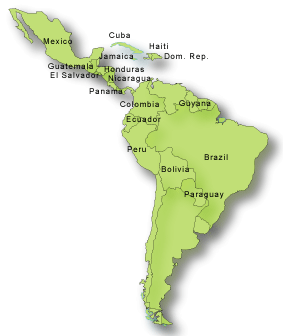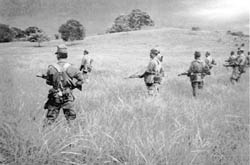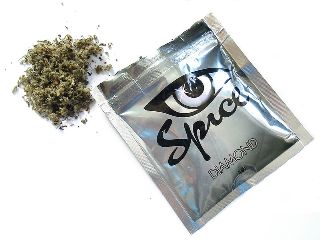The drug policy wheel is turning, and the US and its hard-line repressive drug policies are becoming increasingly isolated in the hemisphere as in the past week alone 150 million Latin Americans came under one form of decriminalization or another.
Canadian cannabis entrepreneur and legalization advocate Marc Emery is just weeks away from a US federal prison term. But if US and Canadian authorities think they can shut him and his supporters up, they are in for a surprise.
Here's the latest on the prohibition-related carnage wracking Mexico.
We have a Deep South trio of dirty cops this week.
The Obama administration said it wouldn't raid medical marijuana providers who act in accordance with state law, but a bust last week raises a few questions.
In the latest ugly twist in the Will Foster saga, the medical marijuana patient has been extradited back to Oklahoma so the Sooner State can extract a few more pounds of flesh -- and a few more years in prison for growing a plant.
Who has the lowest marijuana possession fine in the nation? Denver is poised to take that honor.
The cops need to get a warrant before asking power companies to record electricity usage, an Alberta court says.
Here's the latest twist on Dutch efforts to deal with "drug tourism." Maybe Belgium, France, and Germany should just change their laws instead.
Some legal highs in Britain soon won't be so legal.
Events and quotes of note from this week's drug policy events of years past.
Every two years drug policy reformers from across the United States and around the world come to the International Drug Policy Reform Conference to listen, learn, network and strategize together for change. This year the conference is in Albuquerque, in November, and StoptheDrugWar.org is a partner.
As part of our summer fundraising drive, DRCNet is pleased to offer Ryan Grim's exciting new book, "This Is Your Country on Drugs: The Secret History of Getting High in America," as our latest membership premium. Things are happening, and the importance of your support at this time could not be greater.
Do you read Drug War Chronicle? If so, we need your feedback to evaluate our work and make the case for Drug War Chronicle to funders. We need donations too.
Apply for an internship at DRCNet and you could spend a semester fighting the good fight!
In the last eight days, the decriminalization of drug possession has gone into effect for 150 million Latin Americans. Last Thursday, as part of a broader bill, Mexico (pop. 110 million) decriminalized the possession of small amounts of all drugs through the legislative process. Four days later, the Argentine Supreme Court declared unconstitutional that country's law criminalizing drug possession. While the Argentine case involved marijuana possession, the ruling clears the way for the government to draft a new law decriminalizing all drug possession.

Latin America map (usaid.gov)
The shift in policies toward drug users in the two countries is a dramatic indication of the seismic shift in drug policy already well underway in Latin America. Colombia's high court declared the law against drug possession unconstitutional in 1994. Brazil has had a version of decriminalization since 2006 -- users cannot be imprisoned, but can be forced into treatment, educational programs, or community service -- and Uruguay now allows judges to determine if someone in possession of drugs intended to use them or sell and to act accordingly. Movement toward decriminalization is also underway in Ecuador.
That reformist zeitgeist is perhaps best encapsulated in the Latin American Commission on Drugs and Democracy, led by former presidents Cesar Gaviria of Colombia, Ernesto Zedillo of Mexico, and Enrique Cardoso of Brazil. In its report earlier this year, Drugs and Democracy: Toward a Paradigm Shift, the commission called for decriminalization of drug use, especially marijuana, and treating drug use as a public health -- not a law enforcement -- issue. A similar commission got underway in Brazil last week.
"Decriminalization permits a distinction between users and drug traffickers," said John Walsh of the Washington Office on Latin America. "This allows governments to focus their efforts in reducing the terrible harms caused by the big criminal networks and the violence related to the illicit traffic, instead of repressing users and small-scale dealers."
"What's happened in Mexico and now Argentina is very consistent with the broader trend in Europe and Latin America in terms of decriminalizing small amounts of drugs and promoting alternatives to incarceration and a public health approach for people struggling with drug addiction," said Ethan Nadelmann, executive director of the Drug Policy Alliance. "The decision in Argentina reminds me of similar rulings in Colombia more than a decade ago and in Germany before that, and, more generally, what's been going on in the Netherlands, Portugal, and Switzerland. In some cases, there is a legal or constitutional notion about personal sovereignty or autonomy, but there is also a recognition of the failures of the drug war approach vis a vis low-level offenders. There is a kind of human rights element that you see popping up in both contexts," Nadelmann said.
But the devil is in the details. Mexico's decriminalization, for example, comes as part of a broader law aimed at "narcomenudeo," or small-scale drug dealing. In addition to decriminalizing drug possession, the law for the first time allows state and local authorities to arrest and prosecute drug offenders. Previously, such powers had been the sole province of federal authorities. The new law also allows police to make undercover drug buys, a power they did not previously possess. (To read the full text of the law in Spanish, go to page 83 of the Official Daily.)
Under the Mexican law, the amounts of various drugs decriminalized are as follows:
- opium -- 2 grams
- cocaine -- 1/2 gram
- heroin -- 1/10 gram
- marijuana -- 5 grams
- LSD -- 150 micrograms
- methamphetamine -- 1/5 gram
- ecstasy -- 1/5 gram
For Mexican drug reformers, the law is definitely a mixed bag. The Collective for an Integral Drug Policy, a Mexico City-based reform think-tank, felt compelled to note that while "the law represents certain advances... it could have very negative consequences for the country" because the public health and human rights perspectives are not implicated strongly enough in it.
While the collective applauded the law's distinctions between consumer, addict, and criminal; its rejection of forced drug treatment, its lip service to harm reduction, and its recognition of the traditional, ritual use of some substances, it challenged other aspects of the law. "It focuses on intensifying a military and police strategy that has proven to be a failure," the collective said, alluding to the more than 12,000 people killed in prohibition-related violence since President Felipe Calderon unleashed the military against the cartels in December 2006.
"The law will criminalize a vast group of people who make a living off the small-time dealing of drugs, but who in reality do not consciously form part of organized crime," but who are instead merely trying to make a living, the collective argued. "Imprisoning them will not diminish the supply of drugs on the street, nor will it improve public security, yet it will justify the war on drugs, since the government will be able to boast of the number of people incarcerated with this policy."
"Mexican decriminalization will have no impact whatsoever on the broader issues of drug trafficking and violence," agreed Nadelmann. "From the legal and institutional perspective, this is very, very significant, but in terms of actual impact on the ground in Mexico, that remains to be seen."
The collective also criticized the law's provision allowing police to make drug buys to nab small-time dealers and warned that the small quantities of drugs decriminalized "are not realistic" and will as a consequence lead to "a significant increase in corruption and extortion of consumers by police forces."
University of Texas-El Paso anthropologist Howard Campbell, who has studied the street drug scene across the river in Ciudad Juarez, was more cynical. "It was a good move by the government to make that distinction between users and traffickers, but I'm not sure what the effects of the law will be," he said. "All over Mexico, cops prey on junkies, and one effect of this might be to give low-down junkies a bit of a break from the cops. On the other hand, street-level drug dealing is often controlled by the cops... but if the cops are corrupt and in control, it doesn't really matter what the law says."
Campbell also doubted the new law would have much effect in reducing the prohibition-related violence. "I don't think it will have much initial impact, but still, the overarching importance of this law is symbolic. It shows that governments can revamp their policies, not just keep on working with failed ones," he said.
In Argentina, the situation is less dire and the reform is less ambiguous. On Tuesday, the Argentine Supreme Court, ratifying a series of lower court decisions in recent years, declared that the section of the country's drug law that criminalizes drug possession is unconstitutional. While the ruling referred only to marijuana possession, the portion of the law it threw out makes no distinction among drugs.
The decision came in the Arriola case, in which a group of young men from the provincial city of Rosario were each caught with small amounts of marijuana, arrested, and convicted. Under Argentina's 1989 drug law, they faced up to two years in prison.
But imprisoning people absent harm to others violated constitutional protections, a unanimous court held. "Each individual adult is responsible for making decisions freely about their desired lifestyle without state interference," their ruling said. "Private conduct is allowed unless it constitutes a real danger or causes damage to property or the rights of others. The state cannot establish morality."
"It is significant that the ruling was unanimous," said Martin Jelsma, coordinator of the Drugs and Democracy program at the Transnational Institute, which has worked closely with Latin American activists and politicians on drug reform issues. "It confirms the paradigm shift visible throughout the continent, which recognizes that drug use should be treated as a public health matter instead of, as in the past, when all involved, including users, were seen as criminals."
That paradigm shift has also occurred within the current Argentine government of President Cristina Kirchner, which favors a public health approach to drug use. The government has been waiting on this decision before moving forward with a bill that would decriminalize possession of small quantities of all drugs.
"The declaration of the unconstitutionality of the application of the drug law for marijuana possession is a great advance since it eliminates the repressive arm from a problem that should be confronted with public health policies," said Intercambios, an Argentine harm reduction organization. "Whatever retreat in the application of the criminal law in relation to drug users is positive; not only to stop criminalizing and stigmatizing users, but to permit the advance of educational, social, and health responses that are appropriate for this phenomenon."
Some Argentine harm reductionists warned that while the ruling was of transcendent importance, its real impact would be measured by its effect on the policies of the state. "In the vertical sense, it should oblige all the judges in the country to take heed of this declaration of the unconstitutionality of punishing drug possession for personal use," said Silvia Inchaurraga of the Argentine Harm Reduction Association (ARDA). "In the horizontal sense, it should force all the agencies of the state involved in drug policy to redefine their involvement to guarantee that they do not fail to comply with international human rights treaties subscribed to by the country," she added.
For the Argentine section of the global cannabis nation, it was a happy day. "Wow! This feels like honest good vibrations from the Supreme Court and the government," said Argentine marijuana activist Mike Bifari. "They really do have this new policy of generally being more tolerant and talking about human rights in the drug issue nationally and internationally, instead of that tired old war on drugs."
The Supreme Court decision will pave the way to full decriminalization, he said. "Although this was a marijuana case, the current law is about all types of drugs," said Bifari. "Now we have to wait for the government's scientific committee to come up with a draft of a new drug law, and that will be the government's bill in the congress. We think there are going to be lot of media debates and lots of discussion, and what we will try to do is to occupy all the different cultural spaces and try to advance on issues such as access and medical marijuana."
And so the wheel turns, and the United States and its hard-line drug policies are increasingly isolated in the hemisphere. As anthropologist Campbell noted, "This is happening all over Latin America. You'd think we might be able to do it here, too."
back to top
Canada's Prince of Pot, Marc Emery, has less than a month of freedom remaining before he heads to the US border to be handcuffed and escorted to federal court in Seattle, where he will accept a plea bargain and probable five-year prison sentence for selling marijuana seeds over the Internet. But while he is resigned to years of imprisonment for his actions and beliefs, he is by no means giving up the fight and vows to reemerge stronger and more motivated than ever.

Marc Emery, on the Farewell Tour
Emery rose to prominence in the marijuana legalization movement more than a decade ago, after moving from Ontario to Vancouver, where he set up shop as a marijuana entrepreneur, operating cannabis cafes, establishing
Cannabis Culture magazine, and operating the Marc Emery Seed Company. Always a thorn in the side of repressive authorities, Emery tussled repeatedly with Canadian bureaucrats, spoke out frequently and loudly (and at length) about the injustice of pot prohibition, founded the British Columbia Marijuana Party (BCMP), ran for office repeatedly, and, using the profits from his enterprises, donated generously to the reform movements in both Canada and the US.
His outspoken activism brought him to the attention of US authorities, and in July 2005, he and two employees, Michelle Rainey and Greg Williams, were arrested in Vancouver at the behest of the DEA on a US warrant charging them with marijuana trafficking for their seed sales. DEA administrator Karen Tandy crowed loudly at the time about shutting down a leading funding source for legalization eforts, but quickly backtracked when accused of undertaking a politically motivated prosecution.
After four years of legal tussles, Rainey and Williams accepted plea bargains that allowed them to serve probationary sentences in Canada. Now, Emery, too, has accepted a plea deal.
The agreement comes after Canada's Conservative government rejected a plea deal last year that would have allowed Emery to plead to a Canadian offense and serve his time in a Canadian prison. It was also clear that the Canadian government would not block his extradition to the US.
Faced with a possible life sentence if convicted on all counts, Emery agreed to plead guilty to conspiracy to traffic marijuana, and will appear for sentencing in federal court in Seattle on Monday, September 21. But if he is to vanish into the American drug war gulag, it is going to be with a bang, not a whimper.
This summer, Emery and his young wife, Jodie, have been on a farewell tour, crisscrossing Canada to bid a temporary adieu to his legions of supporters. Emery is consistently drawing crowds in the hundreds and generating media coverage wherever he goes as he renews his longstanding call for marijuana legalization and urges supporters to agitate around getting him transferred to a Canadian prison to do his time.
And Emery is calling on his supporters to organize demonstrations on his behalf on Saturday, September 19, two days before his sentencing. Local demos are already set up in several dozen towns and cities, and more are welcome.
"There will be worldwide rallies for Marc," said Cannabis Culture editor Jeremiah Vandermeer. "There are already 50 cities on the list, and more signing up every day. We basically just want to show support for Marc and his cause and demand his freedom. We're also asking people to send respectful letters to the judge." (For more information on holding a rally or writing a letter, click here.)
"Marc is probably the most noted marijuana activist within the Americas," said Allen St. Pierre, executive director of the National Organization for the Reform of Marijuana Laws (NORML). "Much of that is due to his tremendous ego and publicity stunts, but that does not diminish the work he has done. He's always tried to use the political system to advance change, and he has certainly used his entrepreneurial talents as well, in publishing, seed sales, the hemp business, and his downtown Vancouver shop."
St. Pierre pointed out that Emery's activism was not limited to marijuana law reform. "If you are a Canadian, you have to respect the man because for all intents and purposes, Canadians have the equivalent of First Amendment rights only because of the cases he brought as a bookseller in the early 1990s," he said. "His contribution to free speech and knowledge really marks his life, and his cannabis activism is sort of a metaphor for that. He provided unsanctioned information about how to grow marijuana, its therapeutic value, the religious component, all that. Before his challenges to Canadian censorship laws, the government would have said you don't have the right to know that."
Before his incarnation as Prince of Pot, Emery was a libertarian bookseller in Ontario, and it was there that he brought repeated successful court challenges to Canadian censorship laws, including a battle to win the right to sell High Times magazine in the country.
Emery's activism also included pumping money into the drug reform movement, both in Canada and the US. While he was raking in the dollars with his seed company, much of the profits were being plowed right back into the fight.
"I've witnessed him giving money to virtually every drug reform group in the US, which puts him in the top 1% in the Americas," said St. Pierre. "He is in the elite in that respect, and unlike George Soros and Peter Lewis, who picked people to choose where their money would go, Marc's philosophy seemed to be let all the flowers bloom. It wasn't huge money, like Soros and Lewis, but it was a lot of money, and that's pretty remarkable."
Among the beneficiaries of Emery's munificence was the Seattle Hempfest, which could count on him to come up with a couple of thousand dollars for last minute expenses, the Drug Truth Network, and the US Marijuana Party, among others. Loretta Nall was head of the US Marijuana Party.
"Marc alone funded my activities from September 2002 until his arrest in 2005," she said. "The total amount was something on the order of $150,000. Even after he was arrested he continued to try and send money when he could despite his own major need for cash to pay his lawyers."
Nall became an activist after her home was raided by police in helicopters. When she wrote a letter to the editor of the local newspaper to protest the raid, she was arrested shortly later.
"Marc stepped in and hired an attorney for me, gave me a job a Pot TV News anchor and roving activist in the US. He funded my trip to Goose Creek South Carolina, Colombia, South America, the first DPA conference I ever attended and everything in between," Nall recalled. "While working for him he also paid for my daughter to have ear surgery which cost over $6,000 and he provided me with whatever I requested. Marc taught me practically everything I know about drug policy reform. He was my rock when I wanted to run away from Alabama and not fight because I was scared. He was and is my mentor. I owe him a great deal," she said.
"Marc Emery has been as important to the movement as Martin Luther King Jr. was to the civil rights movement here in Alabama in the 1960's," Nall continued. "No one individual has done more to promote outright rebellion -- peaceful of course -- of the unjust marijuana laws than Marc. No one has put their ass on the line for this cause more than Marc."
"We gave away $4.5 million for the movement," said Emery Wednesday from a hotel in Saskatoon, Saskatchewan, where he and Jodie continued his farewell tour. "We paid for the defense of early compassion clubs, like Philippe Lucas's, we've been paying their lawyer for years to litigate for them, we were the chief funder of the 1998 Washington, DC, medical marijuana initiative, we helped Dean Becker's Cultural Baggage/Drug Truth Network stay afloat, and now he's on hundreds of stations."
"The farewell tour is going great," Emery said. "It feels good. I love talking to and meeting people all across the country and inspiring them to do a lot of activism. And Jodie and I are having a wonderful time in our last month together. I'm blessed to be with such an intelligent, lucid, and lovely wife."
Emery, of course, is agitating to the bitter end. "I tell my Canadian audiences that I fully expect them to have legalized it by the time I get back. With all that's going on in Latin America, we're starting to see a huge group of countries not in sync with prohibitionist drug policies, and I will be disappointed if Canada hasn't joined that group."
He is also urging supporters to act on his behalf. "I'm urging Americans to lobby the Bureau of Prisons and Canadians to lobby the Ministry of Public Safety to get me transferred back to Canada," he said. "I'm also urging people to vote out the Conservative government here. The US and Canada have a treaty allowing nationals to serve their time in their home country, but the Conservatives are not taking back weed prisoners. We need people to vote this government out. In the meantime, we'll be hitting them with phone calls and emails. We have the people to swamp them."
But Emery is also preparing for his time behind bars. "I'll be writing a book based on my life, and I'll be holding myself to finishing a chapter every two weeks," he said. "I also plan on learning French and Spanish, French because I intend to become a Member of Parliament and want to be able to speak with all my constituents, and Spanish because it is the most widely spoken language in the hemisphere."
"There were several dozen seed sellers the US could have gone after, but they focused almost exclusively on Marc and now they are making him a martyr," said NORML's St. Pierre. "Unfortunately for the US government, they chose to martyr someone who is keen on martydom, and all those years he will have to spend in prison is just going to further personify him, certainly in Canada but also in the US, as someone who is being treated incredibly unfairly."
For a sense of how unfairly, one need only recall the last time Emery was convicted of seed-selling in Canada. In that 1998 case, he was fined $2,000. BC appeals courts more recently have suggested a proper sentence for seed-selling was a couple of months in jail and a year or two on probation.
Between that 1998 conviction and his 2005 arrest on US charges, Emery paid in more than $600,000 in Canadian income taxes. Canadian authorities did not bother him again, nor did they have any qualms about accepting his tax monies.
Now, Emery is preparing to become America's best known marijuana prisoner. "When they're out to get you, they're out to get you. It doesn't matter that they can't point to a single victim of my 'crimes,'" he said. "After 20 years of work, I can be the one person everyone will be aware of who is in prison for marijuana."
And he remains adamant about ending prohibition. "What is the public benefit in prohibition? There is none. We get more drugs, more drug use, more gangs, the treasuries are empty, the jails are full, but they don't care about that. The only thing important to a prohibitionist is suffering. They think we must suffer because we have a moral failing. They have a puritanical hatred for what we represent."
The forces of prohibition may have won a temporary victory in their battle to shut up the Prince of Pot. But it may well be a pyrrhic one.
back to top
by Bernd Debusmann Jr.
Mexican drug trafficking organizations make billions each year trafficking illegal drugs into the United States, profiting enormously from the prohibitionist drug policies of the US government. Since Mexican president Felipe Calderon took office in December 2006 and called the armed forces into the fight against the so-called cartels, prohibition-related violence has killed over 12,000 people, with a death toll of over 4,000 so far in 2009. The increasing militarization of the drug war and the arrest of several high- profile drug traffickers have failed to stem the flow of drugs -- or the violence -- whatsoever. The Merida initiative, which provides $1.4 billion over three years for the US to assist the Mexican government with training, equipment and intelligence, has so far failed to make a difference. Here are a few of the latest developments in Mexico's drug war:

Mexican anti-drug patrol
- The mother and brother of the reputed head of the La Familia drug cartel were arrested by Mexican authorities. This came despite explicit threats on television last month by Servando Gomez, the cartel boss, that any action against his family would bring retaliation. Gomez's mother, Maria Teresa Martinez, was released two days after her arrest because of a lack of evidence. The brother, Luis Felipe Gomez Martinez, is still being held.
-43 Mexicans were indicted by federal courts in Chicago and Brooklyn. The indictments, unsealed Thursday , charge them with operating a coast-to-coast distribution network through which drugs and money have flowed for the last 20 years. The three most high profile suspects -- JoaquÃn Guzmán Loera, Ismael Zambada GarcÃa and Arturo Beltrán Leyva -- are the current and former leaders of the Sinaloa cartel, although Beltran Leyva now operates his own, independent organization. 35 of the 43 suspects remain at large, while the other eight were arrested during the last week in Chicago and Atlanta.
Saturday, August 22:
-The Mexican government decriminalized small amounts of marijuana, cocaine, heroin and meth. Under the new laws, people are now allowed to have 5 grams of marijuana, 50 mg of heroin, half a gram of cocaine, and 40 mg of meth. Mexican prosecutors believe that the new law will help in the war against drug cartels by allowing federal prosecutors to focus on combating large-scale traffickers and distributors rather than small-time users. This change in policy comes at a time when drug cartels are selling an increasingly large number of drugs domestically. A 2008 government study found that the number of drug addicts in Mexico had almost tripled in the past six years.
-In Ciudad Juarez gunmen killed a Mexican army officer and another man in a bowling alley. Gunmen entered the Bol-Bol bowling alley and gunned down Captain Alejandro Aranda and an unidentified companion late on Friday night. Aranda was an administrator of a dining hall in a Ciudad Juarez military facility. Also, in Tijuana, three police officers were wounded when their patrol cars came under fire from suspected cartel gunmen.
Monday, August 24:
-The Mexican Army announced on Monday that it has captured a leading member of the La Familia drug cartel in the Pacific coast city of Manzanillo. Luis Ricardo Magana, also known by the alias "19 1/2" (traffickers frequently use numerical codenames), is alleged to be responsible for the cartel's shipments of methamphetamine to the United States. He is one of Mexico's most wanted fugitives and is also thought to be involved in the planning of retaliatory attacks on federal police agents. Also on Monday, in the state of Sinaloa, a cooler containing four severed heads was found by the side of rural road. The headless bodies were found some 3 miles away.
-16 people were killed during a 24-hour period in Ciudad Juarez. Among the victims was a police officer who wanted to resign after having previously received unspecified threats. In a separate incident, a group of heavily armed gunmen shot and killed a 15-year-old boy outside his home. The 16 killed now bring the death toll in Ciudad Juarez for the year over 1,100 killed.
Tuesday, August 25:
-Another 29 people were killed in drug-related violence across Mexico during a 24-hour period. Among the victims were a police commander and two of his officers in Nayarit who were killed when the car in which they were traveling was attacked by gunmen wielding automatic weapons. In Gomez Palacio, Durango, two prison guards were found dead, while, in a separate incident, gunmen attacked a couple. The man died while the woman was left in serious condition. In Nogales, a cooler containing a dismembered human body was left at the entrance to a technical university. Additionally, six individuals were killed in Ciudad Juarez, three bodies were found at a ranch in Sonora, four people were murdered in Guerrero, and parts of nine human bodies were found across Sinaloa.
-Recent court documents examined by the Houston Chronicle detail an ultra high-tech communications network employed by a Mexican drug trafficking organization. The federal court documents detail the testimony of Jose Luis Del Toro Estrada, 38, who is alleged to be a cartel communications expert. According to his testimony, his organization uses a string of hand-held radios on a network which stretches from Guatemala to the Mexico-Texas border. His team included an expert who specialized in installing radio towers and antennas, and another who researched new technology.
Total reported body count for the last week: 155
Total reported body count for the year: 4,587
Read last issue's Mexico drug war report here.)
back to top
We have a Deep South trio of dirty officers this week. Let's get to it:
In Brandon, Mississippi, a veteran drug enforcement officer with the Rankin County Sheriff's Office was arrested August 20. Deputy Scott Walters, head of drug enforcement and the department's drug dog officer, is charged with falsifying his time sheet. That charge is a felony. More charges could follow.
In Cochran, Georgia, a Cochran police officer was arrested August 20 on drug and other charges. Officer Elijah Mills, 30, faces charges of conspiracy to sell a controlled substance and violating his oath of office. His arrest comes as the Georgia Bureau of Investigation is investigating allegations of misconduct in the department.
In Baton Rouge, Louisiana, a former East Baton Rouge Parish sheriff's deputy was sentenced last Friday to 10 years in prison on drug charges. Former deputy Larry Wright, 28, was convicted of attempted possession with intent to distribute cocaine and possession of a firearm in furtherance of a drug trafficking offense. He will also do three years of supervised release after serving his time.
Read last issue's corrupt cops stories here.
back to top
A massive DEA operation featuring dozens of heavily armed agents and at least four helicopters ended with the arrests of five people in California's Lake County last week. According to California NORML, the arrests are believed to be the first since the Obama administration announced it would not target medical marijuana providers in states where it is legal unless they violated both state and federal law.
The DEA seized 154 marijuana plants from Upper Lake resident Tom Carter, and arrested him, former UMCC dispensary operator Scott Feil and his wife, Steven Swanson, and Brett Bassignani. Carter is a registered medical marijuana patient and provider, and his wife, Jamie Ceridono, told the Lake County News he was growing for several patients and his grow was legal under state law.
The genesis of the bust appears to lie with an alleged May deal between a DEA informant and Bassignani to purchase marijuana. According to documents filed by Carter's federal defenders late last week, the informant claimed to have arranged to buy marijuana from Carter and to have left a voicemail message for Carter to set up the deal. That same informant allegedly made a deal to buy marijuana from Bassignani.
In the document, the federal defenders said prosecutors made no claim that Carter ever heard the phone message the informant allegedly left, and they set out no evidence linking Carter and the informant.
"All the complaint says is that another individual, Mr. Bassignani, called the informant, claimed he worked for 'Carter Construction,' and arranged a marijuana deal," Carter's defense attorneys wrote. "The deal later took place, and the only other reference to Mr. Carter is the conclusory claim that the informant 'had agreed on the price with Carter.' No context, no specifics, and no other information is provided in the complaint which indicates that Mr. Carter in fact talked to the informant, arranged a marijuana deal, and indicated that he (Carter) was knowingly involved in a marijuana transaction."
Moving that the two felony counts of marijuana trafficking against Carter be dismissed, the attorneys added: "This complaint is sadly deficient with regard to whether Mr. Carter has done anything to indicate that he conspired to break the law. It should be dismissed accordingly."
It is unclear why Feil and his wife were arrested. They are neighbors of Carter and his wife.
Carter and Feil are being held in Oakland, where they are set to have initial detention hearings this week. Federal prosecutors have asked that Carter be held pending trial "on the basis of flight risk and danger to the community."
Carter is a long-time resident of Upper Lake, prominent construction contractor, and community benefactor.
"California already has enough federal marijuana criminals," said CANORML coordinator Dale Gieringer, "It's time for concrete changes in federal law."
While the Obama administration has announced it would not go after law-abiding medical marijuana providers, the DEA has conducted at least two raids against providers in San Francisco and Los Angeles, although there have been no arrests in those cases. The administration has not announced any changes in federal laws or regulations around medical marijuana, and Bush appointees continue to serve in the DEA and the US Attorney's Office of Northern California, which is prosecuting the case.
back to top
Medical marijuana patient Will Foster is behind bars in Oklahoma after being picked up last Friday by Oklahoma law enforcement officials. He had been held at the Sonoma County Jail in Santa Rosa, California, for the past 15 months as he fought bogus marijuana cultivation charges there -- he was a registered patient with a legal grow -- and, after the California charges were dropped, on a parole violation warrant from the Sooner State.

Will Foster (medicalmarijuanaofamerica.com)
Foster had been arrested and convicted of growing marijuana in Oklahoma and sentenced to 93 years in prison in the 1990s. After that draconian sentence focused national attention on his case, he was eventually resentenced to 20 years in prison. He later won parole and moved to California, where he served three years on parole and was discharged from parole by California authorities.
That wasn't good enough for vindictive Oklahoma authorities, who wanted to squeeze more years out of Foster. He refused to sign Oklahoma paperwork requiring him to return there to serve out the remainder of his sentence. He also refused to sign paperwork that extended his original service. Oklahoma authorities issued a parole violation warrant, and the governors of both states signed it.
Foster had sought to block extradition by filing a writ of habeas corpus -- he had won a similar writ against Oklahoma earlier -- but that effort failed last Friday, and Oklahoma authorities were there to whisk him away. Foster is scheduled to be held at the Tulsa County Jail before being assigned to a prison in the Oklahoma gulag.
Efforts by Foster supporters to secure his release continue and are now focusing on Oklahoma parole authorities and the state governor. For more information about the Foster case, see our Chronicle story here and Ed Rosenthal's blog here.
Drug War Chronicle will continue to follow the Foster case. Look for a feature article next week.
back to top
Denver could soon see a maximum $1 fine -- the lowest in the country -- for simple marijuana possession. The city's Marijuana Policy Review Panel voted 6-2 Wednesday to recommend that the city do just that.

Denver skyline (from denvergov.org)
The panel was created by Mayor John Hickenlooper in December 2007 to comply with the will of voters who had just passed an ordinance making adult marijuana possession offenses the lowest law enforcement priority. That vote came after a 2005 vote to legalize marijuana in the city, a vote that was ignored by local law enforcement and prosecutors, who instead charged offenders under state law.
In May 2008, the city attorney's office set the fine for possession at $50 and arranged for payment to be made by mail instead of at a court appearance. Now it will be up to the city's presiding judge to decide whether to go even further and set the fine at $1.
"By setting the fine at just $1, we are sending a message to Denver officials that the era of citing adults for using a less harmful drug than alcohol is over. It's simply not worth the city's time or resources," said panel member and SAFER executive director Mason Tvert, who coordinated the successful Denver marijuana initiatives.
A Denver Police Department representative on the panel unsurprisingly voted against the proposal. "There's no indication that there's a problem with the fine schedule," said Lt. Ernesto Martinez. "The panel is going outside the bounds of the language of the ordinance."
But, in a sign of the times, Martinez appears to be the one out of step with the panel and public opinion in the Mile High City.
back to top
In a bid to stop the flow of tens of thousands of Belgian, French, and German marijuana consumers into Dutch border town cannabis coffee shops, the Dutch government announced this week that is investing 150,000 Euros ($213,000) in a pilot membership card program for coffee shop clients in Maastricht. The program was first proposed earlier this year by Maastricht Mayor Gerd Leers.

downstairs of a coffee shop, Maastricht (courtesy Wikimedia)
The foreign marijuana consumers have caused various public safety and public nuisance problems, from congested automobile traffic to public urination and attracting street drug dealers. At least two other Limburg province border towns, Roosendaal and Bergen op Zoom, have responded to the problem by saying they will close down all their coffee shops.
Under the membership card scheme, only card-carrying coffee shop members could purchase cannabis, and purchased would be limited to three or five grams a day. Such a move would presumably deflate the number of "impulse" drug tourists.
There are about 700 cannabis coffee shops in Holland. While the Dutch federal government is hostile toward them, it has committed not to act against them before the 2010 elections. That leaves efforts to reduce their numbers or otherwise restrict them in the hands of local officials.
The federal government is also spending about $7 million for various local councils to address various problems associated with coffee shops, where users can purchase up to five grams of cannabis without fear of arrest. Ministers want to reduce the number of large coffee shops and reduce the involvement of organized crime.
But that latter problem is largely an artifact of Holland's half-baked approach to marijuana. While the Dutch allow the possession and sale of small amounts of cannabis through the coffee shop system, they have made no provision for a regulated supply of cannabis for the coffee shops, leaving it to the black market.
back to top
The British Home Office announced Tuesday that it is planning to ban several "legal highs," including "Spice," the club drug GBL, and the stimulant drug BZP. The substances will be added to the British list of controlled substances by year's end, said Home Secretary Alan Johnson.

''spice'' packet (courtesy wikimedia.org)
"There is a perception that many of the so called 'legal highs' are harmless, however in some cases people can be ingesting dangerous industrial fluids or smoking chemicals that can be even more harmful than cannabis," said Johnson. "Legal highs are an emerging threat, particularly to young people, and we have a duty to educate them about the dangers."
"Spice" is a sort of synthetic cannabinoid which is currently sold legally as a spray to apply to herbal cigarettes. It has already been banned in France and Germany. It will become a Class B drug -- in the middle tier of the British classification scheme -- like amphetamines or marijuana.
GBL (Gamma-butyrolactone) and a similar chemical, which are converted in to the Class C drug GHB (gamma-hydroxybutyrate) in the body and often used as weekend party drugs, will become Class C drugs, the least serious drug classification. So will BZP (Benzylpiperazine) and related piperazines, which are stimulants taken as an alternative to amphetamine.
Under Britain's Misuse of Drugs Act of 1971, possession of Class C drugs can earn up to two years in prison, while possession of Class B drugs can earn up to five years. Dealing in either Class B or Class C drugs is punishable by up to 14 years in prison.
The Home Office has announced an education campaign around these newly classified substances. It is set to start at the beginning of the school year next month.
back to top
August 28, 1964: The Beatles are introduced to marijuana.
September 2, 1994: In Detroit, Judge Helen E. Brown sentences Lazaro Vivas to life in prison for possession of over 650 grams of cocaine. Judge Brown tells Vivas, "I don't think it's fair. It is not a sentence I would give you, if I had any choice. But I have to give you this sentence, because I have to follow the law. So, your sentence is life."
August 28, 1995: The World Health Organization (WHO) publishes "WHO Project on Health Implications of Cannabis Use: A Comparative Appraisal of the Health and Psychological Consequences of Alcohol, Cannabis, Nicotine and Opiate Use." The original version -- not the official one -- states, "... there are good reasons for saying that [the risks from cannabis] would be unlikely to seriously [compare to] the public health risks of alcohol and tobacco even if as many people used cannabis as now drink alcohol or smoke tobacco."
August 30, 1996: The Washington Post reports that presidential hopeful Bob Dole hammered President Clinton for his drug policy and made the war on drugs one of his top campaign issues. Declaring that President Clinton had "surrendered" in the war against drugs, Dole called for an expanded role of the National Guard, and for military and intelligence services to fight drugs.
August 29, 2001: The Dallas Morning News reports that Ernesto Samper, the former president of Colombia, said, "The problem is the law of the marketplace is overtaking the law of the state... We have to ask, is legalization the way out of this? We cannot continue to fight this war alone. If the consuming nations do nothing to curb demand, to control money-laundering, to halt the flow of chemicals that supply the drug-production labs, then in a few short years the world is going to see legalization as the answer."
September 1, 2003: In an effort to save over $30 million in general revenue in five years, Texas implements a new law that requires mandatory community supervision for first time drug offenders adjudged guilty of possession of less than one gram of certain controlled substances or less than one pound of marijuana. Under previous law, such offenders were only eligible for state jail community supervision or incarceration in a state jail facility.
back to top
StoptheDrugWar.org (DRCNet) is pleased to be a partner in the upcoming 2009 International Drug Policy Reform Conference, this November 12-14 at the Hyatt Regency in Albuquerque, New Mexico.
The Reform Conference, sponsored by our friends at the Drug Policy Alliance, is the major biennial gathering of drug policy reformers of all kinds. The last one, held in New Orleans in 2007, brought together over 1,000 attendees representing 25 different countries. This year attendees will have the opportunity to spend three days interacting with people committed to finding alternatives to the war on drugs while participating in sessions given by leading experts from around the world. Click here to register -- early bird rates are available through October 9, and discounts are available for students and New Mexico residents.
Some testimonials from the 2007 conference:
"The conference was a tremendous educational experience. I established tons of contacts and look forward to a future dedicated to fighting the drug war."
"Lots of great energy! This was my very first conference and I would most definitely recommend it to any health care professional desiring information on this subject. The speakers were very educated on their subjects and readily available to answer questions."
"This conference has been an incredible experience. The level of knowledge and experience from the presenters has been fantastic."
"I thought the conference was a wonderful collaboration of minds and knowledge on the multiple aspects of drug policy. I enjoyed having applicable speakers on both sides of the debate of policy and drug reform."
"This conference exceeded my expectations in every way possible. As a first year attendee I had no idea what I would learn."
"Once again, thank you for the most exciting and informative conference in the world."
Hope to see you there.
back to top
Dear friend of drug law reform,
As part of our summer fundraising drive, we continue to offer Ryan Grim's exciting new book, "
This is Your Country on Drugs: The Secret History of Getting High in America," as our latest membership premium.
Donate $36 or more and we will send you a complimentary copy of "This is Your Country on Drugs" as our thanks.
From the antebellum temperance movement, to the unintended consequences of Nixonian and Reaganite anti-drug efforts, to the hard-to-explain '00s LSD shortage, "This is Your Country on Drugs" is an entertaining, enlightening, and accessible account of America's love-hate relationship with psychoactive substances ranging from the nation's beginnings to the present day.
Your support will come at an historic and critical moment. A moment when Congress is moving on a wide range of important reforms to drug policy. When the prohibition debate is reaching new heights. But when despite it all the new drug czar continues to talk nonsense like the old drug czar. I encou
rage you to join us today as we fight this important fight at this important time.
Our ability to bring drug war injustices to the attention of major media, to promote policy change in Congress, to reach millions of people online each year -- all of these are possible because of, and depend on, you.
We continue to offer our exciting new t-shirts that make the point about prohibition and the drug war. For a contribution of $36, you can choose either of our new StoptheDrugWar.org T-shirts pictured to the right — "Prohibition Doesn't Work" or "STOP" (click on images for an enlarged view). For a gift of $60 or more, you can receive both t-shirts. For a contribution of $90 or more, you can receive both shirts and Ryan Grim's book as our thanks, or substitute any item from the StoptheDrugWar.org inventory.
Your membership today will make an immediate impact by helping StoptheDrugWar.org (DRCNet):
- Produce more internet videos like "SWAT Raids -- No One is Safe" and fund more actions like our upcoming News Rewriting Project.
- Grow the groundswell for change by helping grassroots organizations — our movement's "boots on the ground" — reach out to more people.
- Pressure the Obama Administration to make good on all of its promises and lobby Congress to make smart funding choices by providing the truth about the Drug War.
- Break more records! With each improvement to our web site, we become an even more powerful resource for anyone (including media and politicians) to find information about the Drug War.
What you and I and our friends are doing together is working. We can't back off now. By taking advantage of the opportunity we have during this pro-reform climate, we can change minds, change laws and, most importantly, change good people's lives.
Thank you very much,

David Borden
Executive Director, StoptheDrugWar.org (DRCNet)
 P.S. It's time to stop wasting time, money and good people's lives. Please join us in "Changing Minds, Laws & Lives" by adding
your support to StoptheDrugWar.org while we have this unique opportunity. Thank you!
P.S. It's time to stop wasting time, money and good people's lives. Please join us in "Changing Minds, Laws & Lives" by adding
your support to StoptheDrugWar.org while we have this unique opportunity. Thank you!
back to top
Do you read Drug War Chronicle? If so, we'd like to hear from you. DRCNet needs two things:
- We are in between newsletter grants, and that makes our need for donations more pressing. Drug War Chronicle is free to read but not to produce! Click here to make a donation by credit card or PayPal, or to print out a form to send in by mail.
- Please send quotes and reports on how you put our flow of information to work, for use in upcoming grant proposals and letters to funders or potential funders. Do you use DRCNet as a source for public speaking? For letters to the editor? Helping you talk to friends or associates about the issue? Research? For your own edification? Have you changed your mind about any aspects of drug policy since subscribing, or inspired you to get involved in the cause? Do you reprint or repost portions of our bulletins on other lists or in other newsletters? Do you have any criticisms or complaints, or suggestions? We want to hear those too. Please send your response -- one or two sentences would be fine; more is great, too -- email [email protected] or reply to a Chronicle email or use our online comment form. Please let us know if we may reprint your comments, and if so, if we may include your name or if you wish to remain anonymous. IMPORTANT: Even if you have given us this kind of feedback before, we could use your updated feedback now too -- we need to hear from you!
Again, please help us keep Drug War Chronicle alive at this important time! Click here to make a donation online, or send your check or money order to: DRCNet, P.O. Box 18402, Washington, DC 20036. Make your check payable to DRCNet Foundation to make a tax-deductible donation for Drug War Chronicle -- remember if you select one of our member premium gifts that will reduce the portion of your donation that is tax-deductible -- or make a non-deductible donation for our lobbying work -- online or check payable to Drug Reform Coordination Network, same address. We can also accept contributions of stock -- email [email protected] for the necessary info.
back to top
Want to help end the "war on drugs," while earning college credit too? Apply for a StoptheDrugWar.org (DRCNet) internship for this summer or fall semester and you could come join the team and help us fight the fight!
StoptheDrugWar has a strong record of providing substantive work experience to our interns -- you won't spend the summer doing filing or running errands, you will play an integral role in one or more of our exciting programs. Options for work you can do with us include coalition outreach as part of the campaign to rein in the use of SWAT teams, to expand our work to repeal the drug provision of the Higher Education Act to encompass other bad drug laws like the similar provisions in welfare and public housing law; blogosphere/web outreach; media research and outreach; web site work (research, writing, technical); possibly other areas. If you are chosen for an internship, we will strive to match your interests and abilities to whichever area is the best fit for you.
While our internships are unpaid, we will reimburse you for metro fare, and DRCNet is a fun and rewarding place to work. To apply, please send your resume to David Guard at [email protected], and feel free to contact us at (202) 293-8340. We hope to hear from you! Check out our web site at http://stopthedrugwar.org to learn more about our organization.
back to top











